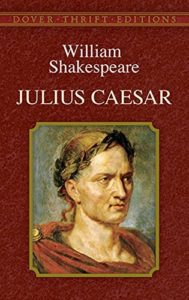
I saw the new production of Shakespeare’s tragedy: Julius Caesar by the Bridge Theatre London. This new show is not for the faint-hearted, involving a significant amount of on-stage shooting, fighting and battlefield effects.
My favorite characters are Gaius Cassius Longinus played by Michelle Fairley and Marcus Brutus by Ben Whishaw. Michelle Fairley performed marvellously. I was holding my breath many times during the show for both actors, fearing that they might forget a line or stumble. My concern was not necessary at all. As for Mark Antony and the young Octavius also known as Augustus, I have a lot prejudice against both men for their killing of my favorite Roman, Cicero. Nevertheless, one cannot overlook the achievements and historic impacts of Augustus. Julius Caesar, based on my readings of history over the years, is a character I admire and loathe with probably equal intensity.
To this day, we use Julius Caesar and Augustus’s names to mark two important months of a year: July and August. We use the phrase crossing the Rubicon to mean passing a point of no return, taken from when Julius Caesar led his army across the river Rubicon and marched towards Rome, a declaration of war on the Roman Senate.
How petty many of our struggles in life seem to be against the backdrop of the history of civilisation? To put things into perspective and to learn from the greatest is one benefit of my love for history, besides the immense joy it brings me.
Spectacles are worn to correct my nearsightedness, history is read to broaden my vision.
The lines from Shakespeare’s writing echo in my ears through the voices of the amazing cast of the show.
Caesar:
Cowards die many times before their deaths;
The valiant never taste of death but once.
Of all the wonders that I yet have heard.
It seems to me most strange that men should fear;
Seeing that death, a necessary end,
Will come when it will come.
Cassius:
Men at some time are masters of their fates:
The fault, dear Brutus, is not in our stars,
But in ourselves, that we are underlings.
Brutus on persuading Cassius to fight at Philippi:
Under your pardon. You must note beside,
That we have tried the utmost of our friends,
Our legions are brim-full, our cause is ripe:
The enemy increaseth every day;
We, at the height, are ready to decline.
There is a tide in the affairs of men,
Which, taken at the flood, leads on to fortune;
Omitted, all the voyage of their life
Is bound in shallows and in miseries.
On such a full sea are we now afloat;
And we must take the current when it serves,
Or lose our ventures.
Brutus speaking to the citizens about the death of Caesar at the Forum:
Be patient till the last. Romans, countrymen, and lovers! hear me for my cause, and be silent, that you may hear: believe me for mine honour, and have respect to mine honour, that you may believe: censure me in your wisdom, and awake your senses, that you may the better judge. If there be any in this assembly, any dear friend of Caesar’s, to him I say, that Brutus’ love to Caesar was no less than his. If then that friend demand why Brutus rose against Caesar, this is my answer:
–Not that I loved Caesar less, but that I loved Rome more.
Had you rather Caesar were living and die all slaves, than that Caesar were dead, to live all free men? As Caesar loved me, I weep for him; as he was fortunate, I rejoice at it; as he was valiant, I honour him: but, as he was ambitious, I slew him. There is tears for his love; joy for his fortune; honour for his valour; and death for his ambition. Who is here so base that would be a bondman? If any, speak; for him have I offended. Who is here so rude that would not be a Roman? If any, speak; for him have I offended. Who is here so vile that will not love his country? If any, speak; for him have I offended. I pause for a reply.
Mark Antony speaks to the Roman citizens with Caesar’s corpse presented at the Forum, stirring up the public towards a mutiny. You should read his whole speech. How very insanely cunning in influencing public opinions! Here is the excerpt approaching the end.
Good friends, sweet friends, let me not stir you up
To such a sudden flood of mutiny.
They that have done this deed are honourable:
What private griefs they have, alas, I know not,
That made them do it: they are wise and honourable,
And will, no doubt, with reasons answer you.
I come not, friends, to steal away your hearts:
I am no orator, as Brutus is;
But, as you know me all, a plain blunt man,
That love my friend; and that they know full well
That gave me public leave to speak of him:
For I have neither wit, nor words, nor worth,
Action, nor utterance, nor the power of speech,
To stir men’s blood: I only speak right on;
I tell you that which you yourselves do know;
Show you sweet Caesar’s wounds, poor poor dumb mouths,
And bid them speak for me: but were I Brutus,
And Brutus Antony, there were an Antony
Would ruffle up your spirits and put a tongue
In every wound of Caesar that should move
The stones of Rome to rise and mutiny.